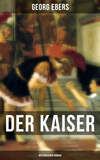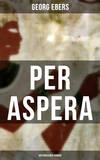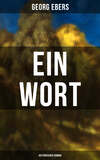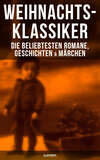Kitabı oku: «Margery (Gred): A Tale Of Old Nuremberg. Complete», sayfa 14
He had already fallen in love with Ann at the Hallerhof, and never quit her side although, after I had overheard certain sharp words by which Ursula Tetzel strove to lower the maid in his opinion, I told him plainly of what rank and birth she was.
For this he cared not one whit; nay, it increased his pleasure in making much of her and trying to spoil her shrewish foe’s sport. It seemed as though he could never have enough of dancing with Ann, and so soon as the town pipers struck up, with cornets, trumpets, horns, and haut-boys, fiddles, sack-buts and rebecks, the rattle of drums and the groaning of bagpipes, while the Swiss fifes squeaked shrilly above the clatter of the kettle-drums, methought the music itself flung him in the air and brought him low again. With his free and mirthful ways he carried all before him, and when presently it was plain to all that he could outdo our nimblest dancers, and was a master of each kind of dance which was held in favor at every court, whether of Brandenburg, of Saxony, of Bohemia, or at our own Emperor Sigismund’s Hungarian court, he was ere long entreated to show us some new figures of the dance; nor was he loth to do so.
Nay, he presently went to such lengths that our Franconian and Nuremberg nobles could but turn away their faces, inasmuch as he began so wild and unseemly a dance as was overmuch even for me, despite my youth and sheer delight in the quick measure.
My Hans, the young councillor, took pleasure in leading me forth in the Polish dance, or with due dignity in the Swabian figure, but he held back, as was fitting, from the mad whirl of the gipsy dance and of the “Dove dance;” and he, and I likewise, courteously withstood his bidding to join in the Dance of the Dead as it was in use in Brandenburg, Hungary, and Schleswig: one has to be for dead, and as he lieth another shall come to wake him with a kiss. On this Junker von Beust, who was, as the march—men say, the dance-corpse, entrapped Ann in a strange adventure. Ann kissed not his cheek, but in the air near by it, and the bold knave, who had no mind to forego so sweet a boon, declared to her after the dance was over that she was his debtor, and that he would give her no peace till she should pay him his due.
Ann courteously prayed him that he would be a merciful creditor and remit the payment of that she had indeed omitted, though truly out of no ill-will. And whereas he would by no means consent, the dispute was taken up by others present and Jorg Loffelholz devised the fancy of holding a Court of Love to decide the case.
This met with noisy approval, and albeit I and my dear Hans, and some others with us, made protest, the damsels were presently seated in a circle and Jorg Loffelholz, who was chosen to preside, asked of each to pronounce sentence. Thus it came to the turn of Ursula Tetzel and she, looking round on Junker Henning or ever she spoke, said, with a proud curl of her red lips, that she could give no opinion, inasmuch as she only knew what beseemed young maids of noble birth.
On this the Junker answered with such high and grave dignity as I should not have looked for in so scatter-brained a wight: “The best patent of nobility, fair lady, is that of the maid to whom God Almighty has vouchsafed the gentlest soul and sweetest grace; and in all this assembly I have found none more richly endowed with both than the damsel against whom I in jest have made complaint. Wherefor I pray the presiding judge of this Court of Love to ask you once more for your verdict.”
Ursula found this ill to brook; nevertheless her high spirit was ready to meet it. She laughed loudly, and with seeming lightness, as she hastily answered him: “Then you haughty lords of the marches allow not that it is in the Emperor’s power to grant letters of nobility, but ascribe it to Heaven alone! A bold opinion. Howbeit, I care not for politics, and will pronounce my sentence. If it had been Margery Schopper, who had refused the kiss, or Elsa Ebner, or any one of us whose ancestors bore arms by grace of the Emperor, and not of the God of the Brandenburgers, I would have condemned her to give you, in lieu of one kiss, two, in the presence of witnesses; but inasmuch as it is Mistress Ann Spiesz who has dared to withhold from a noble gentleman, a guest of the town, what we highborn damsels would readily have paid I grant her of our mercy, grace and leave to kiss the hand of Junker Henning von Beust, in token of penitence.” The words were spoken clearly and steadfastly; all were silent, and I will confess that as Ursula gave her answer to the Junker with beaming eyes and quivering lips, never had I seen her more fair. It could plainly be seen by her heaving bosom how gladly she gave free vent to her old cherished grudge; and that she had in truth wounded the maid she hated to the very soul, Ann showed by her deathly paleness. Yet found she not a word in reply; and while Ursula was speaking, meseemed in the fullness of my wrath and grief as though a cloud were rising before my eyes. But so soon as she ceased and my eyes met the triumphant look in hers, my mind suddenly grew clear again, and never heeding the multitude that stood about us, I went a step forward, and cried: “We all thank you, Junker; you have taken the worthier part; the only part, Ursula,” and I looked her sternly in the face, “the only part which I would have a friend of mine take, or any true heart.”
The Junker bowed, and with a reproachful glance at Ursula he said: “Would to God I might never have a harder choice to make!” Whereupon he turned his back on her and went up to Ann; but Ursula again laughed loudly and called after him in defiance: “Oh! may heaven ever keep your wits clear when you have to choose, and especially when you have to discern on the high-road betwixt what is your own and what belongs to other folks.”
The blood mounted to the Junker’s face, and, as with a hasty gesture he smoothed back the fierce hair on his lip, methought he might seem the same as when he rose in his saddle to rush down on our merchants’ wains; for indeed it was the Beusts, with the Alvenslebens, their near kinsfolks, who had fallen upon the train of waggons belonging to the Muffels and the Tetzels, near Juterbock, not a year ago.
But, hotly as his blood boiled, the Junker refrained himself, inasmuch as knightly courtesy forbade him to repay Ursula in the like coin; and as it fell Cousin Maud was enabled to aid him in this praiseworthy selfrule. She came forward with long strides, and her eyes flashed wrathful threats, till meseemed they were more fiery than the jewels in the tall plumes she wore on her head. She thrust aside the young men and maid who made up the Court of Love as a swift ship cuts through the small fry in the water. Without let or pause she pushed on, and as soon as she caught sight of Ann she seized her by the arm, stroked her hair and cheeks, and flung a few sharp words at Ursula:
“I will talk to you presently!” Then she bid me remain behind with Hans and withdrew, carrying Ann with her, while Junker Henning followed praying to be forgiven for all the discomfort she had suffered by reason of him. This Ann gladly granted, and besought us and him alike to come with her no further.
When he came back to us Ursula, who was aggrieved by the looks of displeasure she met on all sides, cried out: “Back already, Sir Junker? If you had so lightly yielded your rights to kiss of mine, you may be certain that I would have appealed to any one who would do my behest to call you to account for such scorn!”
She eyed the young nobleman with a bold gaze, never weening that this challenge was all he waited for. He tossed his curly head, and cried with sparkling eyes: “Then, mistress, I would have you to know that I would take no kiss from you, even if you were to offer it. I have spoken—now call forth your champions.”
He was silent a moment, and then, glancing round at the bystanders with defiant looks, he went on: “If any gentleman here present sets a higher price than I, the high-born Henning Beust, heir and Lord of Busta and Schadstett, on a kiss from the lips which have wronged my fair lady with spiteful speech, let him now stoop and pick up my glove. There it lies!”
And he flung it on the ground, while Ursula turned pale. Her eyes turned from one to another of the young gentlemen who paid her court and they were many—and the longer silence reigned the faster came her breath and the hotter waxed her ire. But on a sudden she was calm; her eyes had lighted on Sir Franz von Welemisl, and all might read what she demanded of him. The Bohemian understood her; he picked up the glove and muttered to the Junker with a shrug: “Mistress Ursula commands me!”
A look of pain passed over the brave youth’s merry face, for that heretofore the young knight and he had been in good fellowship, and he hastily answered: “Nay, Sir Knight; I would have crossed swords with you readily enough or ever you had felt the prick of Swabian steel; but now you are not yet fully yourself again, and to fight with a friend who is sick is against the rule of my country.”
The words were spoken from a kind and honest heart, and I saw in Sir Franz’s face that he knew their intent was true; but as he put forth his hand to grasp the Junker’s, Ursula tossed her head in high disdain. Sir Franz hastily changed his mien, and cried: “Then you will do well to act against the rule of your country, and fight the champion of the lady you have offended.”
Here the dispute had an end, forasmuch as that my lord the duke, leader of the embassy, hearing the Brandenburger’s fierce voice, came in haste from the supper-board to restore peace; and as he led away the Junker it was plain to all that he was taking him sharply to task. It was, in truth, a criminal misdeed in one of the Imperial envoy to cast down his glove at a dance, where he was the guest of a peaceful city; and that the duke imposed no severe penance for it the Junker might thank the worshipful members of the council who were present; they were indeed disposed to let well alone, inasmuch as they had it at heart to send the whole party home again well-pleased with Nuremberg.
The music was soon sounding merrily again in the solemn town-hall, and of all the young folks who danced so gleefully, and laughed and chattered Ursula was the last to let it be seen how this grand revel had been troubled by her fault. Her eyes were bright with glad contentment, and she was so free with Sir Franz that it might have seemed that they would quit the town hall a plighted couple.
The festival was drawing to an end, and when I had danced the last dance, and was looking about me, I beheld to my amazement Ursula Tetzel in eager speech with Junker Henning. On our way home the young gentleman informed me that she had given him to understand that, during the meeting of the Imperial Assembly, he might look to be waited on by a noble youth who would pick up his glove in duty to her, and prove to him that there were other than sick champions glad to draw the sword for her.
The Brandenburger would fain have known with whom he would have to deal; but I held my peace, albeit I felt certain that Ursula had set her hopes on none other than my brother Herdegen.
On the morrow the whole of the Ambassadors’ fellowship rode away, back to the emperor’s court; I, for my part made my way to the Pernharts, where I found Ann amazed rather than wroth or distressed by Ursula’s base attack. Also she was to have some amends; my dear godfather, Uncle Christian, with certain other gentlemen of the council, had notified old Tetzel that he was required to crave pardon of Ann and her stepfather for his daughter’s haughty and reckless speech.
The proud and surly old man would have to submit to this penance without cavil, by reason that Pernhart had, since Saint Walpurgis’ day, been a member of the council, and he and his family had part and share in the patrician festival. For, albeit craftsmen and petty merchants were excluded, the worshipful councillors chosen by the guilds enjoyed the same rights as those born to that high rank.
It was by mishap only that the coppersmith had not been at the town-hall yestereve, and on a later day, when he and his wife appeared there, they were among the finest of the elder couples. Ann did not, indeed, go with them; but it was neither vexation nor sorrow that kept her at home. My great gladness as it were warmed her likewise, and we were looking for Herdegen’s speedy home-coming.
She looked forward to this with such firm hope as filled me with fears, when I minded me of my brother’s letters, in which he never had aught to tell of but vain pleasures and pastimes.
My betrothal to Hans Haller was after his own heart; he wrote of him as of a man whose gifts and birth were worthy of me; and went on to say that he would follow his example, and, whereas he had renounced love in seeking a bride, he would take counsel of his head, and not of his heart, and quarter our ancient coat of arms with one no less noble.
CHAPTER XVIII
Though Ann’s hopeful mood distressed me, these same hopes in my world-wise Aunt Jacoba raised my spirit; but again, when I heard my grand-uncle speak of Herdegen as his duteous son, it fell as low as before. The old man had shown much contentment at my plighting to Hans, and had given me a precious set of rubies as a wedding gift; yet could I scarce take pleasure in them, inasmuch as he told me then and there that he had the like in store for the noble damsel whom Herdegen should wed.
Cousin Maud was in great wrath, when she knew that we had it in our minds even yet to bring Ann and Herdegen together; howbeit this did not hinder her from being as kind to Ann as she was ever wont to be, and giving her pleasure with gifts great and small whenever she might. She had her own thoughts touching my brother’s faithlessness. She deemed it a triumph of noble blood over the yearnings of his heart; and the more she loved to think well of her darling the more comfort she found in this interpretation.
Among those few who had known of his betrothal to Ann was the bee-master’s widow, Dame Henneleinlein; and she had cradled herself so gladly in the hope of being ere long kin to a noble family, that its wrecking filled her heart with bitter rage, and in all the houses whither she carried her honey she never failed to speak slander of Herdegen.
All this would never have troubled me, if only I might have rejoiced in the presence of my dear love; but alas! no more than three weeks after our betrothal he was sent, as squire to Master Erhart Schurstab, away to court, where they were to lay before the Emperor Sigismund in the name of Nuremberg the various hindrances in the way of our trafficking with Venice, whereas since the late war his Majesty had been mightily ill-disposed towards that great and famous city.
There was no remedy but patience; my lover wrote to me often, and his loving letters would have filled me with joy, if it had not been that in each one there was ever some sad tidings of Junker Henning, whom I yet held in high esteem. This young lord, who was in attendance on his Majesty—who never held his court for more than a few days at the same place—or ever he left Vienna to go to Ratisbon, had made a close friendship with my plighted master, and had been serviceable to him in all things wherein he might; and Hans had said of him that he was one in whom there was no guile, with the open heart and bright temper of a child. Such an one, indeed, was his; yet, in the midst of the gayest mirth, his grief of heart would so mightily come upon him that he fell into a sudden gloom; and out of the fulness of his sorrow he confessed to Hans that he could never cease to think of Ann. Whereupon my dear love conceived that it must be his woeful duty to tell his friend that the lady of his choice had no free heart to give him. Yet to the Junker’s question whether she were plighted to another, and whether he were minded to wed her, Hans was forced in truth to say nay. This gave the lovesick youth new courage, and at length he went so far as that Hans enquired of me whether Ann might not after all be willing to give up Herdegen, who well deserved it at her hands, and to take pity on so brave and true-hearted a lover as the Junker.
To this I could make no answer other than: “Never—never;” inasmuch as, having shown Ann this letter, and, moreover, loudly sung the praise of her suitor, she asked me right sadly whether I was weary of confirming her in her love for my brother; and when I eagerly denied this, she cried: “And you know me well! And you must know that nothing on earth—nor you, nor Mistress Jacoba, nor all Nuremberg, could turn my heart from my love!”
This did I forthwith write to Hans; but that letter never reached him, and thus was he delivered from the grievous duty of robbing the Junker of his last hope.
Alas, my Hans! How sorely I did long for thee every hour! And yet shall I ever remember the month of June in that year with thankfulness.
Day after day did we maidens sit in the Hallers’ garden, for Hans’ worthy mother had soon taken Ann into her heart, and it became a fear to me ere long lest her rare beauty should turn the head of his younger brother Paulus, a likely lad of nineteen. As the summer waxed hot we went into the forest at the bidding of my uncle and aunt, who took great joy in seeing their favorite in right good heart and wondrous beauty, Mistress Giovanna having provided her with seemly and brave apparel. Nor was there any lack of good fellowship; many young noblemen bore us company, and whereas the town was full of illustrious guests, many of them found their way out to the forest.
This was by reason that the Prince Electors and the other rulers of the Empire, and foremost of them all our High Constable, had, indeed, declared that the great Assembly should be held at Nuremberg and not at Ratisbon; and when they were all gathered in our good town, the Emperor Sigismund, after he had waited for five days at Ratisbon, was fain at last, whether or no, to follow them hither. Then had his Chamberlains been sent before him, and among them again came Duke Rumpold von Glogau and Junker Henning von Beust, while his Majesty kept my Hans still about his person. Now, when the Emperor’s forerunners had fulfilled their duties, they likewise were bidden to the forest-lodge; and with them came the lord of Eberstein, and an Italian Conte, Fazio di Puppi, both well skilled in song and the lute. Yet was my brother Herdegen still absent, albeit we had looked for him at Whitsuntide.
Cousin Maud bided at home, where there was much to be done in preparing fitting cheer for the noble fellowship who were to be lodged in the Schopperhof; nay, the old house was to be decked outside with a festal dress, in obedience to the behest of the town-council that every citizen should do his utmost so to cleanse and adorn his house, that it should please the eyes of his Majesty the Emperor.
Towards evening on Saint Liborius’ day,—[July 23rd.]—my lord the Duke came forth on horseback to the forest lodge, and as I write, I can see the beaming countenance of Junker Henning as he greeted Ann; she, however, took his devoted demeanor coolly and courteously, yet could she not hinder him from coming between her and the other gentlemen in an over-marked way. The company was a large one for us two maidens, and there was none other with us save Elsa Ebner, our best-beloved schoolmate, and on her young Master Jorg Loffelholz had cast his eyes.
Not long after dinner Akusch came to me with the tidings that Herdegen had ridden into Nuremberg yestereve. My grand-uncle, to whom he had sent word of his coming, had gone forth to meet him on the way, and, with him Jost Tetzel and his daughter Ursula. My brother had alighted at the Im Hoff’s house, and had waited on Cousin Maud this morning early. In the afternoon it was his intent to come out to the forest with my uncle’s leave, to see me.
When I repeated all this to Aunt Jacoba, she was mightily disturbed and bid me stand by Ann, and in all points obey the counsel she might find it good to give her. She desired I would fetch my friend to her July 23rd. forthwith, and then made a plan for all the young folks to go forth to the fair garden of a certain bee-keeper, one Martein, where flowers grew in great abundance, and where we might wind the wreaths which Uncle Christian would need to grace the Empress’ chambers withal. Thither, quoth she, would she send Herdegen on his coming; for she knew full well that the tidings brought by Akusch could not remain hid.
Whereas Ann turned a little paler, my aunt shook her head in displeasure, and admonished her to remain calm; albeit she had charges to bring against that wild youth, yet, for the present, she must keep them to herself. Least of all was she to let him suppose that his faithlessness had caused her any bitter heart-ache; if she desired that matters end rightly she must command herself to receive the home-comer no more than kindly, and to demean her as though his denying of her had touched her but lightly; nay, as though it were a pleasure to her vanity to be courted by the Brandenburg Junker and other noble gentlemen. If she could but seem to rate him as less than either of them, she would have won a great part of the victory.
Such subtlety had no charm for Ann; howbeit, my aunt gave no place to her doubting, and once more her urgent eloquence prevailed on the sorrowing maid to govern the yearning of her soul; and when I promised my friend to support her, she gave the wise lady, who had shown her such plain proofs of her devoted friendship, her word that she would in every point obey her.
Many a time have we seen, in the churches of Nuremberg, certain acting of plays wherein right honest and worthy persons have appeared as Judas Iscariot, or even as the very Devil himself; and at Venice likewise have I seen such plays, called there Boinbaria, wherein men and women, innocent of all guilt, were made to stand for Calumny, Cruelty, and Craft; and that so cunningly that a man might swear that they were reprobate Knaves full ripe for the gallows. From this it may be seen that men are fit and able to seem other than they are by nature; nay, such feigning is a pleasure to most folks, as we plainly see from the delight taken by great and small alike in mummery at Carnival tide. Howbeit, they can scarce have their heart in such sport; and for my part, meseemeth that to play such a part as my aunt had set before Ann is one of the hardest that can be laid upon a pure-hearted and truthful maid. At the time I wist not clearly what was the end of such rash trifling; but now, when I know men better, meseems it was well conceived, and could not fail of its intent, albeit the course of events made it plain to my understanding how little the thoughts and plans of the wisest can avail when Heaven rules otherwise.
The gentlemen in the hall were more than ready to agree to our bidding; yet none but I could guess what made Ann’s lip to quiver from time to time, while her gay spirit charmed the young men who bore us company through the woods to the beekeeper’s garden.
I and Elsa cut the flowers helped by Jorg Loffelholz, while Ann sat under a shady lime-tree hard by an arbor of honeysuckle, and showed the others, who lay on the grass about her; how to wind a garland. Each one was ready to be taught by lips so sweet, and in guiding of fingers and words of praise or blame, there was right merry laughing and chatter and pastime.
Junker Henning lay at her feet, and near him my Hans’ brother Paulus, and young Master Holzschuher. The Knight von Eberstein had fetched him a stool out from the beekeeper’s house, and twisted and tied with great zeal; the Italian Conte, Fagio di Puppi, struck the mandoline, which he called “the lady of his heart” from whom he never parted even on the longest journey.
When Elsa and I had flowers enough, we sat down with the others, and it was pleasant there to rest in the shade of the lime-tree, whose leaves fluttered in a soft air, while bees and butterflies hovered above the flowers in the warm sunshine. The birds sang no more; they had finished nesting long ago; but we, with our young hearts overfull of love, were in the right mind for song, and when Puppi had charmed us with a sweet Italian lay, and I had decked his lute with a rose as a guerdon, my lord of Eberstein took example from him, and they then besought Ann and me to do our part; but Junker Henning was the more eager. Whereupon Ann smiled on him so graciously that I was in pain for him, and she signed to me, and, I taking the lower part as was our wont, we gave Prince Wizlav’s “Song to Dame Love.” It rang out right loud and clear from our throats over the gentlemen’s heads as they sat at our feet, and through the garden close:
“Earth is set free and flowers
In all the meads are springing,
The balmy noontide hours
Are sweet with odors rare;
The hills for joy are leaping.
The happy birds are singing,
And now, while winds are sleeping,
Soar through the sunny air.
Now hearts begin to kindle
And burn with love’s sweet anguish
As tapers blaze and dwindle.
Love, our lady! lend thine ear!
Would’st thou but spoil our pleasure?
Ah, leave us not to languish!
Who vows to thee his treasure,
Haughty lady, must beware.”
We had sung so much as this when the sound of hoofs, of which we had already been aware on the soft soil of the woods, gave us pause. Then, behold! Ann turned pale and pressed her hands, full of the roses she had chosen for her garland, tightly to her bosom, as though in pain. Junker Henning, who, while she sang, had gazed at her devoutly, nay, in rapture, marked this gesture and leaped to his feet to succour her; but she commanded herself with wonderful readiness, and laughed as she showed him her finger, from which two drops of blood had fallen on her white gown. And while the garden-gate was opening, she held out her hand to the young man, saying in haste: “Pricked,—a thorn!—would you please to take it out for me, Junker?”
He seized her hand and held it long in his own, as some jewel or marvel, before he remembered that he was required to take out the thorn. The other gentle men, and among them my brother-in-law Paulus, had likewise sprung forward to lend their aid; he, indeed, had snatched his lace neck-tie off and dipped it in the fountain.
Meanwhile the new-comers had joined the circle: First, Duke Rumpold, then Jost Tetzel, and lastly Herdegen with Ursula.
I flew to meet him, and when he held me in his arms and kissed me, and wished me joy of my betrothal right heartily, I forgot all old grievances and only rejoiced at having him home once more; till Ursula greeted me, and Herdegen came in sight of Ann. She had remained sitting under the lime-tree, on a saddle cushion of blue velvet, as on a throne; and in truth meseemed she might have been a queen, as she graciously accepted the service of the gentlemen who had been so moved by her pricked finger. The Junker wrapped it with care in a green leaf which, as his lady grandmother had taught him, had a healing gift; Paulus held forth the laced kerchief, and the Italian was striking wailing tones from his lute.
All this to-do, at any other time would, for a certainty, have made sport for me, but now laughing was far from me, and I had no eyes but for Ann in her little court, and for my brother.
At first she feigned as though she saw him not; and whereas the Junker still held her hand, she hit his fingers with a pink, albeit she was never apt to use such unseemly freedom.
Then she first marked my lord the duke, and rose to greet him with a courteous reverence, and not till she had bowed coldly and curtly to Tetzel and his daughter did she seem to be aware that Herdegen was of the company. At that moment I minded me of the morning when Love had thrown her into his arms, and it was with pain and wonder that I marked her further demeanor. In truth it outdid all I could have dreamed of: she held out her hand with an inviting smile, bid him welcome home and to the forest, reproved him for staying so long away from me, his dear little sister, and our good cousin, and then turned her back upon him to desire the Junker to place her cushions aright. Therewith she gave this young gentleman her hand to support her to her seat, and asked him whether, in his country, they did not do service and devoir to the divine Dame Musica? And whereas he replied that verily they did, that in his own land he had heard many a sweet ditty sung by noble ladies to the harp and lute, that the children would ever sing at their sports, and that he, too, had oftentimes uplifted his voice in singing of madrigals, she besought him that he would make proof of some ballad or song. The rest of the company joining in her entreaties she left him no peace till he gave way to her desire, and after that he had protested that his singing was no better than the twitter of a starling or a bullfinch, and his ditty only such as he remembered from his boyhood’s time, he sang the song “It rained on the bridge and I was wet” in a voice neither loud nor fine, but purely, and with great modesty.
Ann highly lauded this simple and right childish ditty, and said that she felt certain that she, by her teaching, could make a fine singer of the Junker.
The others were of the same opinion, and Herdegen, meanwhile, who was standing somewhat apart, with Ursula, looked on, marvelling greatly as though he could not believe what his ear heard and his eye beheld.
Then, inasmuch as my lord duke desired to hear more music made, we were ready enough to obey and uplifted our voices, while he leaned on an easy couch, listening diligently, and gave us the guerdon of his gracious praise.










